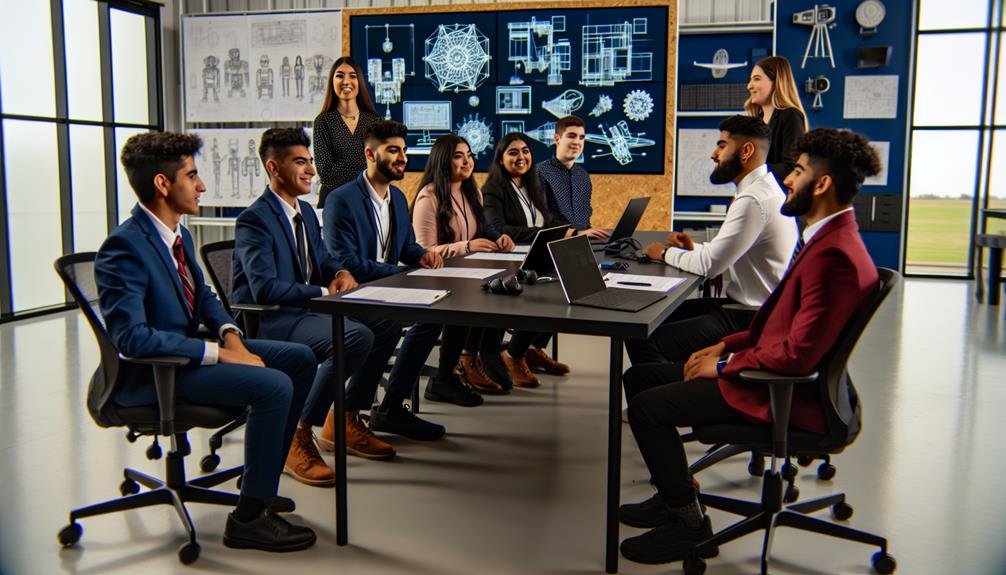How to Prepare for Engineering Job Interviews in India
Did you know that nearly 80% of engineering graduates in India struggle to secure their first job after graduation? If you find yourself among this statistic, understanding how to prepare effectively for job interviews can be a game changer. You'll need to master both technical skills and soft skills while showcasing relevant experiences. But what specific strategies can you adopt to stand out in a competitive landscape? Let's explore the essential steps that could enhance your chances of landing that coveted position.
Key Takeaways
- Research the company's background, values, and culture to align your responses during the interview.
- Highlight relevant educational credentials and practical experiences, including internships and certifications.
- Prepare for technical assessments by practicing coding challenges and familiarizing yourself with programming languages.
- Use the STAR method to structure your responses for behavioral questions effectively.
- Follow up with a thank-you email post-interview to express gratitude and reinforce your interest.
General Interview Preparation
Preparing for an engineering job interview can greatly boost your chances of success. Start by diving into company research. Understand their background, values, products, and culture. This knowledge will help you tailor your responses and show genuine interest in the organization. When you engage in meaningful discussions during the interview, it showcases your enthusiasm and understanding of their work.
Next, practice common interview formats, including behavioral and technical interviews. This preparation allows you to anticipate the types of questions you might face, making you feel more confident. Don't forget to prepare a portfolio that highlights your relevant work and accomplishments. It serves as tangible evidence of your skills and contributions.
Lastly, pay attention to interview etiquette. Dressing appropriately in formal attire creates a positive first impression and reflects professionalism. Remember, how you present yourself matters just as much as what you say. By combining thorough company research with effective practice and proper etiquette, you'll position yourself as a strong candidate. Embrace this preparation process, and you'll walk into your interview ready to shine.
Engineering Experience Insights

When preparing for your engineering job interview, highlighting your educational background can set a strong foundation for your discussion. You'll want to articulate not just what you've studied, but also how your projects contributed to your team's success and the challenges you overcame. By sharing these insights, you'll demonstrate your value and readiness for the role.
Educational Background Importance
An engineering graduate's educational background can play a pivotal role in landing job interviews and securing positions in the competitive Indian job market. The college reputation and degree relevance often weigh heavily in employers' decisions. Graduates from well-regarded institutions tend to have an edge, as these colleges are associated with rigorous training and high-quality education.
| Factors Influencing Job Prospects | Description |
|---|---|
| College Reputation | Graduates from renowned colleges often attract more attention from employers. |
| Degree Relevance | Relevant degrees (B.Tech, M.Tech) align with job requirements, enhancing your suitability. |
| Internship Experience | Practical exposure through internships demonstrates your ability to apply theoretical knowledge. |
| Continuous Learning | Certifications in emerging technologies can greatly boost your attractiveness as a candidate. |
Employers often look for candidates who not only possess the right degrees but also have practical experience and skills relevant to their roles. By focusing on your educational background and continually updating your skills, you can improve your chances of standing out in a crowded job market. Remember, it's not just about what you know, but also how you can apply that knowledge effectively.
Project Contributions Highlighting Success
Highlighting your project contributions is essential for demonstrating your engineering experience and success in interviews. Start by quantifying your achievements. For instance, if you reduced project completion time by 20% through effective resource optimization, share that detail. It shows potential employers you're focused on project efficiency and tangible results.
Discuss any financial impacts your work had. Did you improve system performance by 30% or boost user satisfaction scores from 75% to 90% after implementing a new feature? These metrics illustrate your ability to deliver value.
Consider your role in achieving project milestones. Be specific about your contributions in design, development, or testing phases. This clarity helps interviewers envision where you fit within a team.
Moreover, emphasize collaboration. Share examples of how you motivated peers or resolved conflicts, showcasing your ability to foster a positive work environment. Such insights highlight not only your technical skills but also your interpersonal ones.
Prepare to articulate these elements succinctly. Your ability to convey your project contributions, focusing on efficiency and optimization, can set you apart in the highly competitive engineering job market in India.
Overcoming Challenges in Roles
Steering through the challenges that come with engineering roles can feel intimidating, but it's an integral part of your professional growth. One of the most pressing challenges is mastering time management. Tight project deadlines demand effective prioritization, enabling you to enhance productivity and guarantee timely delivery.
You'll also encounter technical hurdles that require strong problem-solving skills. Embracing systematic debugging methodologies can help you troubleshoot issues efficiently. Furthermore, collaboration challenges often arise when working with cross-functional teams. Developing your interpersonal skills and fostering open dialogue is essential for achieving successful outcomes.
Adaptability skills become critical as project requirements change. A growth mindset allows you to embrace new technologies and methodologies, keeping you ahead in your field.
Lastly, remember that handling criticism and learning from project failures is part of the journey. Instead of viewing setbacks as defeats, treat them as valuable opportunities for growth and improvement in future projects. By cultivating these skills and attitudes, you'll not only overcome challenges but also position yourself as a resilient and effective engineer ready to tackle any situation.
Technical Skills Assessment

While preparing for engineering job interviews, it is vital to focus on the technical skills assessment, as this is often a key component of the selection process. Start by familiarizing yourself with programming languages relevant to your desired position, such as C++, Java, or Python. Most interviews will include technical assessments based on these languages, so a solid grasp is essential.
Next, understand various software development methodologies, like Agile or Scrum. Interviewers often ask how you've applied these methodologies in your projects, so be ready to discuss your experiences.
Don't overlook coding challenges, especially those involving data structures and algorithms. These topics are common in technical interviews, and practicing on platforms like HackerRank or LeetCode can greatly enhance your problem-solving speed and accuracy under pressure.
Problem-Solving and Analytical Skills

Problem-solving and analytical skills are essential for engineering interviews, as they showcase your ability to tackle real-world challenges. By practicing critical thinking techniques, you can enhance your approach to complex scenarios that may arise during the interview. Be prepared to demonstrate how you analyze problems and formulate effective solutions, as this will set you apart from other candidates.
Critical Thinking Techniques
Critical thinking is essential in engineering job interviews, as it showcases your ability to tackle complex problems effectively. To demonstrate this skill, employ the STAR method (Situation, Task, Action, Result) when responding to questions. This structure will help you articulate your past experiences in critical analysis and problem-solving clearly.
Familiarize yourself with common engineering problems and case studies, as this practice will enhance your logical reasoning. Understanding various scenarios prepares you to develop strategies for approaching each situation during the interview. Additionally, engaging in coding challenges on platforms like LeetCode or HackerRank can sharpen your problem-solving skills under time pressure, which is often a component of technical assessments.
Utilizing mind mapping techniques can also be beneficial. By visually organizing your thoughts, you can break down intricate problems into manageable components, aiding in structured analysis. Finally, participating in mock interviews or group discussions can help refine your critical thinking approach. You'll receive valuable feedback on your ability to communicate solutions effectively, ensuring you present yourself as a capable candidate ready to tackle engineering challenges.
Real-World Problem Scenarios
Many engineering job interviews in India include real-world problem scenarios designed to test your problem-solving and analytical skills. You'll likely encounter case study analysis that reflects practical challenges you might face in the workplace. These scenarios often require you to apply engineering principles to analyze complex situations and propose effective solutions.
During interviews, interviewers may present hypothetical situations, such as optimizing a manufacturing process or troubleshooting a system failure. To tackle these, using structured problem-solving methodologies like the DMAIC approach—Define, Measure, Analyze, Improve, Control—can help you systematically address the issue and communicate your thought process clearly.
Additionally, scenario simulations can help you think creatively while showcasing your technical knowledge. Practicing coding challenges and algorithmic problems is vital, as they sharpen your analytical capabilities and prepare you to perform under pressure.
Industry-Specific Knowledge

As you prepare for engineering job interviews, gaining industry-specific knowledge can greatly boost your confidence and performance. Start by familiarizing yourself with current engineering trends in India, such as the rising demand for renewable energy and automation technologies. Understanding these trends not only makes you a more appealing candidate but also shows your commitment to staying updated.
Next, explore regulatory compliance standards relevant to your sector, be it civil, mechanical, or electrical engineering. Employers often seek candidates who understand these regulations, as compliance is critical for project success.
Additionally, keep an eye on emerging technologies like artificial intelligence and the Internet of Things (IoT). Many companies are integrating these innovations to maintain a competitive edge, and showcasing your knowledge in this area can set you apart.
Research major players in the Indian engineering landscape, such as Tata Consultancy Services and Larsen & Toubro. Knowing their projects and work culture can help you tailor your responses during interviews. Finally, be aware of India's engineering challenges, like infrastructure development and sustainable practices, to effectively demonstrate how your skills align with industry needs.
Effective Communication Techniques

Effective communication techniques are essential for success in engineering job interviews, and mastering a few key strategies can make a significant difference. By focusing on clarity and engagement, you can effectively showcase your skills and experiences.
- Utilize the STAR method to structure your responses, allowing for clear and concise storytelling.
- Practice active listening by reflecting on questions before answering, ensuring you fully grasp the interviewer's intent.
- Maintain a positive tone and professional demeanor to create a strong first impression.
- Articulate your technical experiences using specific language and metrics, avoiding vague terms that can dilute your achievements.
- Prepare thoughtful questions related to the company and role, fostering meaningful dialogue.
Post-Interview Follow-Up

A thoughtful post-interview follow-up can set you apart from other candidates and leave a lasting impression on your potential employer. Start by sending a thank-you email within 24 hours of your interview. Express gratitude and reiterate your interest in the position, mentioning specific points discussed to demonstrate attentiveness.
Here's a quick guide on what to include in your follow-up:
| Action Item | Purpose |
|---|---|
| Send a thank-you email | Show appreciation and reinforce interest |
| Mention specific topics | Demonstrate attentiveness and fit for role |
| Request business cards | Facilitate future networking opportunities |
| Reflect on performance | Identify strengths and areas for improvement |
| Follow up on status | Show continued interest if you haven't heard back |
Frequently Asked Questions
How to Do Good in an Engineering Interview?
To do well in an engineering interview, focus on showcasing your technical skills and problem-solving abilities. Research the company thoroughly, so you can tailor your responses and demonstrate genuine interest. Practice common behavioral questions and engage in mock interviews to build your communication skills. Don't forget coding practice to stay sharp. Finally, polish your resume with relevant projects and achievements to make a strong impression. You've got this!
Are Engineering Interviews Difficult?
Did you know that nearly 60% of candidates find engineering interviews challenging? They often test your technical skills through coding challenges and problem-solving scenarios, while also evaluating your fit with company culture via behavioral questions. With various interview formats, including multiple rounds, it's essential to be prepared for the diverse aspects of the process. Emphasizing both your coding abilities and effective communication can help you navigate these demanding interviews successfully.
What Is the Common Question in a Job Interview for an Engineer?
Common questions in engineering interviews often center on your technical skills and problem-solving abilities. You might face coding challenges that test your proficiency in languages like Python or Java. Behavioral questions will likely explore your project experience and teamwork examples, evaluating how you handle challenges. Interviewers also value industry knowledge, so be ready to discuss methodologies like Agile. Finally, strong communication skills can make a significant difference in conveying your ideas effectively.
What Should I Bring to an Engineering Interview?
When you're prepping for an engineering interview, consider creating a resume checklist. Bring multiple copies of your tailored resume and a cover letter that emphasizes your relevant skills. Don't forget your portfolio examples showcasing your projects and problem-solving abilities, as they can spark valuable discussions. Organize everything neatly in a professional folder, and make sure to have a notepad and pen ready for taking notes during the interview. Good luck!
Conclusion
In the grand theatre of job interviews, you've rehearsed your lines and donned your best attire, yet the real performance hinges on authenticity. While you might think memorizing every technical detail impresses, it's your genuine passion and problem-solving flair that steals the spotlight. So, as you step onto that stage, remember: it's not just about showing what you know, but about connecting with your audience. After all, the best engineers don't just build things—they build relationships.
